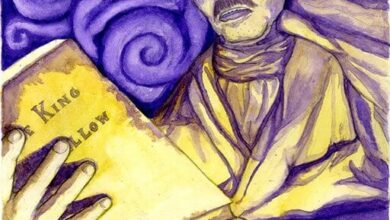
The Story of Daniel Webster by James Baldwin
The Story of Daniel Webster was published in Baldwin’s book for young Americans, Four Great Americans: Washington, Franklin, Webster, Lincoln (1897). Webster was a Congressman and Senator who became known as the ablest lawyer and advocate in America after winning the Dartmouth College case. Above all, he was remembered for his great speeches and patriotism. This story is perfect for young or reluctant readers who are building confidence with chapter books.
Chapter I: Captain Webster
Many years ago there lived in New Hampshire a poor farmer, whose name was Ebenezer Webster.
His little farm was among the hills, not far from the Merrimac River. It was a beautiful place to live in; but the ground was poor, and there were so many rocks that you would wonder how anything could grow among them.
Ebenezer Webster was known far and wide as a brave, wise man. When any of his neighbors were in trouble or in doubt about anything, they always said, “We will ask Captain Webster about it.”
They called him Captain because he had fought the French and Indians and had been a brave soldier in the Revolutionary War. Indeed, he was one of the first men in New Hampshire to take up arms for his country.
When he heard that the British were sending soldiers to America to force the people to obey the unjust laws of the king of England, he said, “We must never submit to this.”
So he went among his neighbors and persuaded them to sign a pledge to do all that they could to defend the country against the British. Then he raised a company of two hundred men and led them to Boston to join the American army.
The Revolutionary War lasted several years; and during all that time, Captain Webster was known as one of the bravest of the American patriots.
One day, at West Point, he met General Washington. The patriots were in great trouble at that time, for one of their leaders had turned traitor and had gone to help the British. The officers and soldiers were much distressed, for they did not know who might be the next to desert them.
As I have said, Captain Webster met General Washington. The general took the captain’s hand, and said: “I believe that I can trust you, Captain Webster.”
You may believe that this made Captain Webster feel very happy. When he went back to his humble home among the New Hampshire hills, he was never so proud as when telling his neighbors about this meeting with General Washington.
If you could have seen Captain Ebenezer Webster in those days, you would have looked at him more than once. He was a remarkable man. He was very tall and straight, with dark, glowing eyes, and hair as black as night. His face was kind, but it showed much firmness and decision.
He had never attended school; but he had tried, as well as he could, to educate himself. It was on account of his honesty and good judgment that he was looked up to as the leading man in the neighborhood.
In some way, I do not know how, he had gotten a little knowledge of the law. And at last, because of this as well as because of his sound common sense, he was appointed judge of the court in his county.
This was several years after the war was over. He was now no longer called Captain Webster, but Judge Webster.
It had been very hard for him to make a living for his large family on the stony farm among the hills. But now his office as judge would bring him three hundred or four hundred dollars a year. He had never had so much money in his life.
“Judge Webster,” said one of his neighbors, “what are you going to do with the money that you get from your office? Going to build a new house?”
“Well, no,” said the judge. “The old house is small, but we have lived in it a long time, and it still does very well.”
“Then I suppose you are planning to buy more land?” said the neighbor.
“No, indeed, I have as much land now as I can cultivate. But I will tell you what I am going to do with my money. I am going to try to educate my boys. I would rather do this than have lands and houses.”
Chapter II: The Youngest Son
Ebenezer Webster had several sons. But at the time that he was appointed judge there were only two at home. The older ones were grown up and were doing for themselves.
It was of the two at home that he was thinking when he said, “I am going to try to educate my boys.”
Of the ten children in the family, the favorite was a black-haired, dark-skinned little fellow called Daniel. He was the youngest of all the boys; but there was one girl who was younger than he.
Daniel Webster was born on the 18th of January, 1782.
He was a puny child, very slender and weak; and the neighbors were fond of telling his mother that he could not live long. Perhaps this was one of the things that caused him to be favored and petted by his parents.
But there were other reasons why every one was attracted by him. There were other reasons why his brothers and sisters were always ready to do him a service.
He was an affectionate, loving child; and he was wonderfully bright and quick.
He was not strong enough to work on the farm like other boys. He spent much of his time playing in the woods or roaming among the hills.
And when he was not at play he was quite sure to be found in some quiet corner with a book in his hand. He afterwards said of himself: “In those boyish days there were two things that I dearly loved—reading and playing.”
He could never tell how or when he had learned to read. Perhaps his mother had taught him when he was but a mere babe.
He was very young when he was first sent to school. The school-house was two or three miles away, but he did not mind the long walk through the woods and over the hills.
It was not a great while until he had learned all that his teacher was able to teach him; for he had a quick understanding, and he remembered everything that he read.
The people of the neighborhood never tired of talking about “Webster’s boy,” as they called him. All agreed that he was a wonderful child.
Some said that so wonderful a child was sure to die young. Others said that if he lived he would certainly become a very great man.
When the farmers, on their way to market, drove past Judge Webster’s house, they were always glad if they could see the delicate boy, with his great dark eyes.
If it was near the hour of noon, they would stop their teams under the shady elms and ask him to come out and read to them. Then, while their horses rested and ate, they would sit round the boy and listen to his wonderful tones as he read page after page from the Bible.
There were no children’s books in those times. Indeed, there were very few books to be had of any kind. But young Daniel Webster found nothing too hard to read.
“I read what I could get to read,” he afterwards said; “I went to school when I could, and when not at school, was a farmer’s youngest boy, not good for much for want of health and strength, but expected to do something.”
One day the man who kept the little store in the village, showed him something that made his heart leap.
It was a cotton handkerchief with the Constitution of the United States printed on one side of it.
In those days people were talking a great deal about the Constitution, for it had just then come into force.
Daniel had never read it. When he saw the handkerchief he could not rest till he had made it his own.
He counted all his pennies, he borrowed a few from his brother Ezekiel. Then he hurried back to the store and bought the wished-for treasure. In a short time he knew everything in the Constitution, and could repeat whole sections of it from memory. We shall learn that, when he afterwards became one of the great men of this nation, he proved to be the Constitution’s wisest friend and ablest defender.



